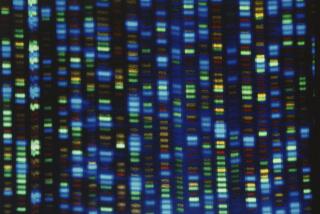NONFICTION - Aug. 14, 1994
- Share via
JUSTICE AND THE HUMAN GENOME PROJECT edited by Timothy F. Murphy and Marc A. Lapp e . (University of California Press: $28; 189 pp.) The genome project is Big Science, an enormous international effort to map and sequence the human genome. The papers presented in this volume are from a conference organized by the U.S. Department of Energy and the University of Illinois in 1991 to explore issues of justice arising from the project. Topics range from the history of eugenics, to health care issues, to the meaning of individual differences, to social prejudice (will genetic probes be used in “matters of employment, insurability, money lending, reproduction,” “will the genome project mark difference as an undesirable trait and justify its eradication?”) and individual choice (will there be equitable access to genetic tests and medical interventions?), and to the fate of the welfare system (if we know how to eradicate genetic defects, will we turn our dollars and attention in that direction, rather than helping genetically disadvantaged people? “will genetic disease become another affliction of the poor?”). Authors come from a variety of disciplines: philosophers, doctors, lawyers, insurers and health care officials. Between them, they lay out a wide range of perspectives. If you have been hearing, out of the corners of your ears, rumors about what those geneticists can and can’t do, about custom-made babies, about social Darwinism and you need some sort of guidebook to the questions and issues and possibilities of this research, here is the book for you. These questions are too important to leave to one author’s perspective, particularly if you are not well-versed enough to recognize that perspective. The great thing about the human genome project, write Murphy and Lappe in their preface, is that these issues and their social and institutional implications are being explored alongside the scientific research. The project is “design self-conscious.” This is meant, I think, to alleviate the pain and fear of ignorance (“The human genome project will be no secretive Manhattan Project . . . “), but it still doesn’t mean that you can control knowledge once you have it. We know that for a fact.
More to Read
Sign up for our Book Club newsletter
Get the latest news, events and more from the Los Angeles Times Book Club, and help us get L.A. reading and talking.
You may occasionally receive promotional content from the Los Angeles Times.










